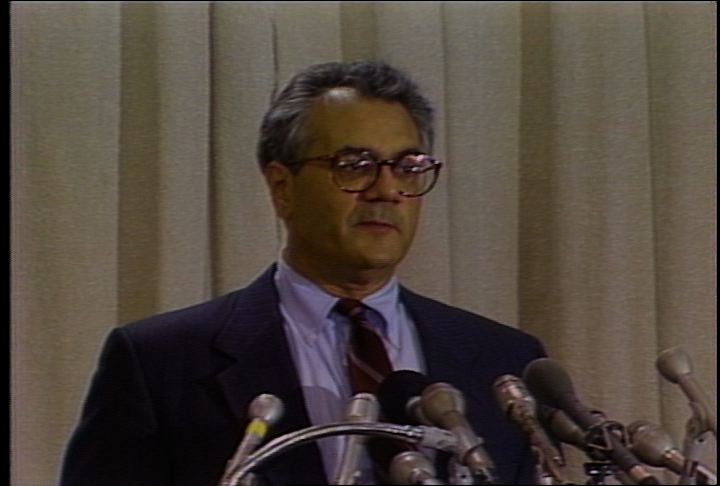
Description:
Hope Kelly reports on a legislative hearing in Boston on alleged redlining practices by Boston banks. Kelly reports that the Federal Reserve Bank released a study finding evidence of redlining practices. Kelly notes that the banking industry reacted strongly to the accusations. Kelly's report includes footage from the legislative hearings. Barney Frank (US Congressman) and Benjamin Hooks (Executive Director, NAACP) condemn redlining practices. Richard Pollard (Chairman, Massachusetts Banking Association) and Richard Syron (President, Federal Reserve Bank) say that they do not believe that the banks are engaged in redlining. Kelly reviews the findings of the study. She adds that the study does not conclude if the findings reflect redlining or discrimination on the part of lenders. Kelly quotes Ray Flynn (Mayor of Boston), Michael Dukakis (Governor of Massachusetts), and Joseph Kennedy (US Congressman) as saying the redlining practices cannot be tolerated. Kelly interviews Pollard. Pollard says that banks are not engaged in redlining. He adds that banks need to better serve the needs of minority communities. Kelly notes that the legislative hearing addressed solutions to the problem of redlining, but did not talk about the problem of racism. This tape includes additional footage of the legislative hearing, with various speakers both in agreement and disagreement with the study.
1:00:05: Visual: Footage of Barney Frank (US Congressman) at a congressional hearing in Boston. Franks says that people of color are being denied their rights because of their skin color. Hope Kelly reports that Frank and other officials said that there is irrefutable evidence showing that Boston banks are engaged in discriminatory lending practices. V: Footage of Benjamin Hooks (Executive Director, NAACP) saying that banks across the nation are engaged in discriminatory lending practices. Kelly reports that the banking industry reacted strongly to the comments. V: Footage of Richard Pollard (Chairman, Massachusetts Banking Association) saying that he does not think that Hooks read the study. Kelly reports that the Federal Reserve Bank issued a study on August 31, 1988. Kelly quotes the study as finding that "the number of mortgage loans. . .is 24% lower in black neighborhoods than in white, even after taking into account economic and other non-racial neighborhood characteristics that might contribute to such disparities." V: Shot of Hooks, Michael Dukakis (Governor of Massachusetts), Richard Syron (President, Federal Reserve Bank), and Ray Flynn (Mayor of Boston) at the congressional hearing. Shot of Syron speaking. On-screen text and visuals detail the study findings. Kelly notes that the study does not conclude whether the findings reflect redlining or discrimination on the part of lenders. V: Footage of Syron speaking at the hearing. Syron says that he does not believe that Boston banks are engaged in redlining or discriminatory practices. Footage of Hooks saying that the African American community often knows through experience what the white community must find out through studies. Kelly reports that city and state officials were sympathetic to Hooks's viewpoint. Kelly quotes Flynn as saying that the findings are disturbing; that discriminatory practices cannot be tolerated. Kelly quotes Joseph Kennedy (US Congressman) as saying that "there is a serious problem of racially discriminatory lending in this city." Kelly quotes Dukakis as saying that "racial bias in any form is contrary to the very principles upon which this nation and Commonwealth were founded." V: Shot of Flynn, Syron, and Dukakis at the hearing. Quotes by Flynn, Kennedy and Dukakis appear written in text on-screen. Kelly reports that the bankers disagreed with the officials. V: Footage of Pollard being interviewed by Kelly. Pollard says that the study contains no evidence showing that banks are involved in the practice of redlining. Pollard admits that people in disadvantaged neighborhoods are ill-served by the financial community. Pollard says that bankers are part of the larger financial community; that bankers will be part of the solution to the problem. Shots of the congressional hearing; of Kennedy at the congressional hearing. Shots of Kweisi Mfume (State Representative) at the hearing; of attendees at the hearing; of Bruce Bolling (Boston City Council) at the hearing. Kelly reports that speakers at the hearing focused on solutions to the problem; that few talked about the larger issue of racism at the heart of the problem. V: Shots of Flynn; of attendees at the hearing.
Date Created:
09/29/1989











